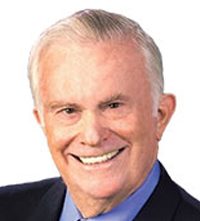The Top 75 World Power Brokers
Democrats’ new jobs plan not friendly to small business.

In a comprehensive study unveiled by Forbes Magazine, it listed the world’s 75 greatest power brokers of its 7.5 billion population in a recent issue.
In this thoroughly well-supported list, Forbes delved into all aspects of influence that a relatively tiny number of “greats” represented. It not only included political leadership but the professional econo/scientific/technical breakthroughs as represented by these titans.
As would be expected, the top three were among the most undisputed, powerful leaders of the world’s three dominant nations — the United States, China and Russia. Xi Jinping, the general secretary of China’s Communist Party, takes the top spot in the 2018 list. President Donald Trump came in at No. 3.
While Russia lags behind in population and gross domestic product, its forceful leader, Vladimir Putin, at No. 2 easily qualified due to the influence Russia attained in the Middle East, as well as its previous power expansion in the Far East.
When delving deeper into the ranks of the 75 most powerful, the names of Jeff Bezos, founder of Amazon, and Pope Francis, head of the global Roman Catholic Church, appear by virtue of their respective positions of dominance. Included also are Bill Gates, whose Microsoft was among the first of the technological breakthrough organizations.
Another example of assessing power is the ability of a unique approach in an area of expertise, which separates these leaders from innumerable others in the extent of power they have attained. A perfect example is Warren Buffett, founder and CEO of Berkshire Hathaway. He is among the world’s richest and influential stock market experts because of his unequaled business empire building, due to his uncanny genius in picking the business segments and growth opportunities that eventually became worth many multiples of what he originally paid for them.
Although politics itself is not necessarily fraught with automatic leadership, the surprising emergence of Emmanuel Macron, newly elected president of France, is a perfect example of a new powerful approach in a leading European nation. It has been internally divided among special interest groups for two centuries, since the ultimate leadership of Napoleon Bonaparte in the earliest decade of the 19th century. The ability to come out of “nowhere” and win an unprecedented presidential majority, while bringing with him a parliamentary following totally committed to the 40-year old novice, is remarkable. Macron has been ranked No. 12 in the Forbes list.
Even Israel’s Benjamin Netanyahu has attained a top ranking due to the returning of the Jewish state to a Mid-East power position. “Bibi” is admired and aggressive, despite his unwillingness to give up one territorial inch in negotiation with those who would destroy Israel.
Jobs Guarantee Plan
Despite the previously assured rejection of U.S. Sen. Bernie Sanders, I-VT, it is likely that his ultra-socialist initiative will head the minority party’s attempt to wrest the White House from President Trump, along with substantial majorities in the U.S. Senate and U.S. House of Representatives.
In the past three months, the Democrat party’s leading 2020 presidential candidates — Sanders, Sen. Cory Booker of New Jersey and Kirsten Gillibrand of New York — have all endorsed a federal jobs plan with health-care guarantees for all the nation’s unemployed to “erase” mass chronic unemployment. It would guarantee a minimum of $15 an hour in conjunction with Medicare for all.
With such unemployment elimination, mass unemployment would become a relic of past “human misery,” referred to by the Democrat party as a genesis of human shortcomings that has previously beset the American nation by increasing numbers as the U.S. population has doubled since the past mid-century from 160 million to more than 320 million people today.
According to this scheme, spasmodic recessions might come and go without the human cost; it would supposedly assure permanent full or private sector wages, especially at the lower end. Despite the estimated additional cost, at near $1 trillion a year, it would be offset by a tax increase on the wealthy, supported by huge savings in Medicaid, unemployment and welfare programs.
Surprisingly, recent polls have had this “pie-in-the-sky” social daydream supported by 52 percent, with only 29 percent against the idea. The idea has proven popular even in red states that voted Republican in the last presidential election.
According to interviews with leading Democrat spokesmen, the plan could bring back to the Democrats the blue-collar and skilled factory employees that handed President Trump his surprising victory.
Most rational governmental observers believe such a scheme, if it became a reality, would further devastate America’s independent businesses already hit hard by the “death tax” and low-priced imports with which small businesses have increasingly been outbid.
Furthermore, the plan would be a setback to the successful economic benefits of the Trump administration’s impressive employment increase and domestic factory expansion. Gone would be the rising hope of the “Made in America” objectives in general. It would again reverse the benefits of a world-leading $19.75 trillion gross domestic product and increase the record 68 percent of GDP consumption with products made at the unbeatable prices overseas.





